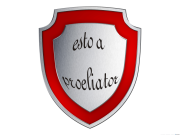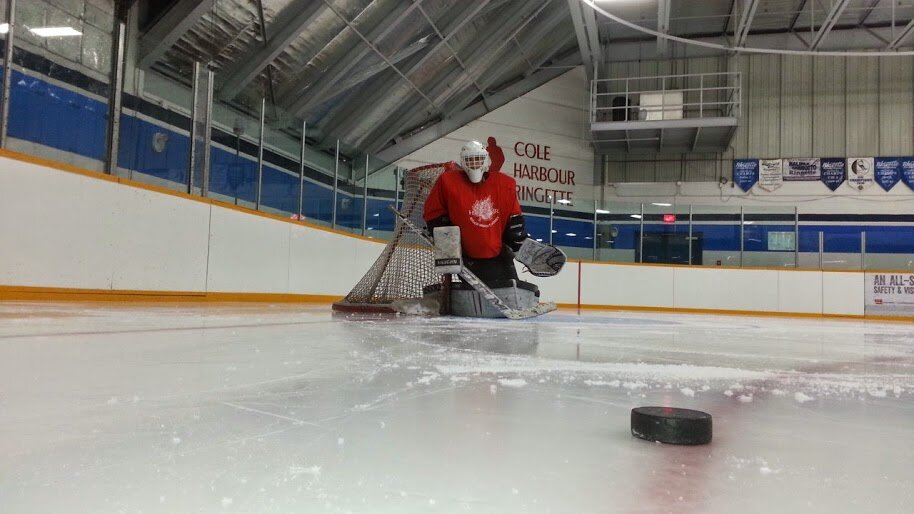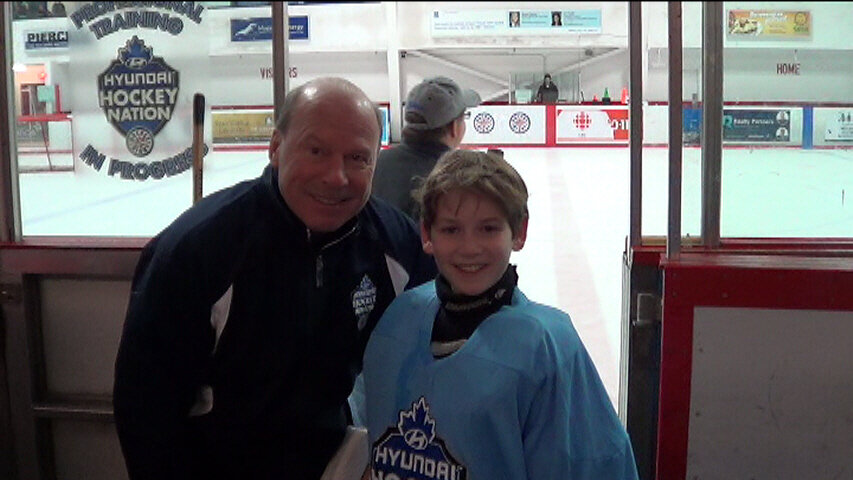Willful Ignorance: The Missing Key to Goaltender Development In Canada
 UE Motto: Be a Warrior!
UE Motto: Be a Warrior!
There are few stories that resonate as deeply as this excellent article written by Kevin Woodley on NHL.COM.
The article discussed the lack of purpose and training benefit for goaltenders in standard team practices at the NHL level. He even made argument that the practice drills with the team could be detrimental to goaltenders as they would "cheat" or "game" drills in order to stop the puck. The essential thrust of the article highlighted the issue that most drills allow the players to shoot with too much time, too much space, and from a too ideal location on the ice. This would allow the players the ability to shoot more accurately with better velocity at the net in its widest range. Corners and money-holes (below the gloves and above the pads) are too easy to hit. Goalies, in order to compensate, will end up cheating, by either over-committing their positioning or opening up leading holes for the shooters to hit and the goalies will then attempt to "time" and take away the hole on shot release.
The bulk of team drills are run in this format, not only at the NHL level, but at all levels. No consideration is given to the goaltenders in terms of how stoppable the shot is or if the shot location and timing is anything close to resembling a game-like scenario. There is an obvious lack of training benefit to goaltenders, and, as an aside, I also think it doesn't serve the players very well either. Goaltender cheat to "game" the flow drills and thereby learn bad habits. Players get to shoot in ideal circumstances and location, in addition, to score excessively in practice, developing a false sense of development or confidence. One of my mentors has always said that all good drills "start and end with the goaltender in mind". If it is good for the goalie, it will be good for the player, but rarely, if ever, is that put into practice.
The strangeness of the situation is often exemplified by drill structure and the coaches explaining the drill to the team and staff. I always have to chuckle to myself watching a coach work up an elaborate break-out/re-group/triangulated attack pattern on the coaching board in a near Jackson Pollock style, and then finish with the hollow instructional phrase, "...and then shoot on net". I think to myself, "wow", the most important part of the drill, in fact the whole point of the game we play, to score a goal, is summarized in three words "shoot on net". In fact, most coaches haven't even really thought about the how and why and where their charges should shoot on net or what could result from it (goals, rebounds, loose pucks, wide shoots, etc.) or their appropraite offensive responses should be. I have even had coaches claim that "goal scoring can't be taught". It is a skill, in their minds, that just "is". There will always be challenges integrating a goaltender with his team in practice.
There will always be challenges integrating a goaltender with his team in practice.
 There will always be challenges integrating a goaltender with his team in practice.
There will always be challenges integrating a goaltender with his team in practice. Well, in my opinion, goal scoring can be taught. Goal scoring, arguably the most important high level skill in the game, can be taught, it can be trained and it can be developed in a large selection of hockey players. But it has to start with one very important field of knowledge: modern goaltending and the role of the position. You can't become a goal scorer if you don't know the position, consciously or unconsciously. And, as a coach, you definitely cannot teach goal scoring, the most important skill in the game, if you don't understand the position of goaltender.
This is where coaching has failed and lost a major development opportunity. I have voiced countless times that this lack of understanding is where Canada has failed in developing goaltenders (and thereby its goal scorers). Canada's slide in goaltending quality was always masked by the huge number of goaltenders in our programs. Great tenders from Canada were always going to appear on the stage in reasonable numbers, since we have a million kids and adults playing the sport. These supremely talented athletes were going to appear regardless of team coaching or even position goalie-specific coaching. Canada doesn't have a shortage of professional goaltending coaches or goaltending knowledge. There could be more, of course, and it always could be better, but of the ones we have, many are very good, and parents and kids have several choices on who to work with in most communities. On top of that, even without a goaltending coach, there is still an amazing amount of information online and in print format. Couple that with countless opportunities to watch peers and heroes on TV or live, there really is no excuse for a goaltender to not find ways to develop goaltender-specific skills, if the motivation is really there.
No, our downfall in goaltending and goaltending quality rests squarely with the coaching culture that we have accepted at both the national and professional level, and which has filtered down to our junior and minor hockey programs. Coaches have become unwilling to learn about the position and the role it plays in the game. As a result, very little of what goes on on the ice during practice helps develop the goaltenders (and in the end, hurts the players, as well). Thousands and thousands of hours are wasted by these goaltenders acting only as a team "shooter tutor". These are development hours that the goaltenders will never get back and the longer they train in that environment, the further they fall behind the competition either locally or internationally.
 Position specific training is essential, but shouldn't the burden of development be shared? This is not from a lack of knowledge or resources available, but a symptom of the hockey culture we have cultivated and now accepted. It is a cultural mindset that we have to tear apart and rebuild. The hidden benefit of a revised coaching culture for our goaltending dilemma would be a major increase in deliberate practice and strong development opportunities. It would mean that the training a goaltender does with his/her team (about 80% if the team has a goaltending coach; 100% if not), will have real meaning and real developmental impact on the athlete. But it has to start with the coaches making a strong and willful effort to understand the position.
Position specific training is essential, but shouldn't the burden of development be shared? This is not from a lack of knowledge or resources available, but a symptom of the hockey culture we have cultivated and now accepted. It is a cultural mindset that we have to tear apart and rebuild. The hidden benefit of a revised coaching culture for our goaltending dilemma would be a major increase in deliberate practice and strong development opportunities. It would mean that the training a goaltender does with his/her team (about 80% if the team has a goaltending coach; 100% if not), will have real meaning and real developmental impact on the athlete. But it has to start with the coaches making a strong and willful effort to understand the position. It is mind-boggling to me that as a nation and a sport, we have accepted that head and assistant coaches can be ignorant to 1/3 of the positions on the ice. There are forwards, defense, and goaltenders. Goaltending is not 1/6th, but 1/3rd or 33% of all the positions in the game. Even if the coaches in question understand every other position perfectly, they are essentially a grade "C" coach at best. It would be like a MLB skip not understanding anything about his pitcher. Or a football coach deciding he shouldn't or needn't understand anything about his quarterback, because, well, he has an offensive coordinator for that and besides, the quarterback's job is easy. He just has to complete passes. Or the pitcher's job is simple, as he just has to throw strikes. Or a goaltender just has to stop shots. A football or baseball head coach at the highest level who "proudly" expressed his ignorance of positions like quarterback or pitcher in public like NHL coaches do on a near nightly basis, would have a pink-slip in his mailbox before he stood up from the press conference.
And as I said, not only is a goaltender an important player, on par with pitcher or a quarterback, it is still only 1/3rd of all the roles on the ice. In addition, I love hockey and it is the best sport in the world, it is in no way near as complex as baseball or football and how all the position work and interact. So in order for a coach to not understand the position of goalie and how it works, he would have to be what Steve McKichan call "willfully ignorant". And that is the worst kind of coach who makes an effort to ignore a section of his team and their development. Practices reflect that. Games reflect that. Personnel management reflects that. The beauty of this problem is that this ignorance is intentional and that it can be corrected by "will not skill" or some secret Scandinavian philosophy.
I have a theory why this "willful ignorance" exists, but I'll save that for another time when I can afford getting fired from more coaching gigs. (j/k)
 With real understanding, a goalie can develop even with the darkest of villains.
With real understanding, a goalie can develop even with the darkest of villains.